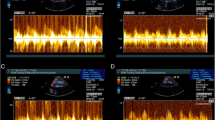Summary
Pharmacologic stress with adenosine is frequently used for noninvasive detection of coronary artery disease. Dietary intake of caffeinated food, beverages or medications might alter adenosine-induced hyperemic blood flow, thereby compromising the diagnostic sensitivity of adenosine stress testing. In this case we report on a male patient with CAD. Mycardial blood flow at rest and during adenosine-induced hyperemia 2 hours after consumption of decaffeinated coffee and again without caffeine intake were quantified by ammonia PET. After caffeine intake there was a clearly diminished increase of myocardial blood flow during adenosine. The average coronary flow reserve in the myocardium was 1.3 after caffeine. In the baseline study without caffeine the coronary flow reserve has been improved to 2.3. Caffeine intake alters the coronary vasodilatory capacity. These findings emphasize the importance of carefully screening patients for intake of caffeinated food prior to adenosine stress testing.
Zusammenfassung
Die pharmakologische Belastung mit Adenosin ist eine häufig eingesetzte Methode zur nichtinvasiven Detektion der KHK mit der Emissionstomographie. Die Einnahme von koffeinhaltigen Lebensmitteln, Getränken oder Medikamenten kann den adenosininduzierten Blutflussanstieg beeinflussen. In diesem Fall berichten wir über einen Patienten mit KHK, bei dem der myokardiale Blutfluss in Ruhe und unter pharmakologischer Belastung mit Adenosin 2 Stunden nach Genuss einer 1 Tasse entkoffeinierten Kaffee und nochmals nach 24 Stunden ohne Koffeineinfluss mit der PET untersucht wurde. Unter Koffeinwirkung war die gemittelte koronare Flussreserve erheblich eingeschränkt [1, 3], während ohne Koffein die Flussreserve deutlich anstieg [2, 3]. Schon eine geringe Menge Koffein beeinflusst die Untersuchung der koronaren Vasodilatationskapazität. Der Fallbericht unterstreicht die Bedeutung einer genauen Koffeinanamnese, um konklusive Resultate in der Ischämiediagnostik zu erhalten.
Similar content being viewed by others
References
Baller D, Gleichmann U, Notohamiprodjo G, Weise R, Holzinger J, Montanus H, Betker S, Lehmann J (1998) Verbesserung der koronaren Vasodilationskapazität durch medikamentöse Lipidsenkung bei Patienten im Frühstadium der koronaren Atherosklerose mit eingeschränkter Koronarreserve und mäßiggradiger LDL-Hypercholesterinämie. Z Kardiol 87(Suppl 2):136–144
Baller D, Notohamiprodjo G, Gleichmann U, Holzinger J, Weise R, Lehmann J (1999) Improvement in coronary flow reserve determined by positron emission tomography after 6 months of cholesterol-lowering therapy in patients with early stages of coronary atherosclerosis. Circulation 99:2871–2875
Böttcher M, Czernin J, Sun KT, Phelps ME, Schelbert HR (1995) Effect of caffeine on myocardial blood flow at rest and during pharmacological vasodilation. J Nucl Med 36:2016–2021
Casella G, Rieber J, Schiele TM, Stempfle HU, Siebert U, Leibig M, Theisen K, Buchmeier U, Klauss V (2003) A randomized comparison of 4 doses of intracoronary adenosine in the assessment of fractional flow reserve. Z Kardiol 92:627–632
Hutchins G, Schwaiger M, Rosenspire KC, Krivokapich J, Schelbert H, Kuhl DE (1990) Noninvasive quantification of regional blood flow in the human using N-13 ammonia and dynamic positron emission tomography imaging. J Am Coll Cardiol 15:1032–1042
Mellwig KP, Baller D, Schmidt HK, v Buuren F, Wielepp JP, Burchert B, Horstkotte D (2003) Myokardiale Perfusion unter H.E.L.P.-Apherese. Z Kardiol 92(Suppl 3):III/30-III/37
Robertson D, Hollister AS, Kincaid D, Workman R, Goldberg MR, Tung CS, Smith B (1984) Caffeine and hypertension. Am J Med 77:54–60
Smits P, Boekema P, De Abreu R, Thien T, van’t Laar A (1987) Evidence for antagonism between caffeine and adenosine in the human cardiovascular system. J Cardiovasc Pharmacol 10:136–143
Smits P, Lenders J, Thien T (1990) Caffeine and theophylline attenuate adenosine induced vasodilation in humans. Clin Pharmacol Ther 48:410–418
Smits P, Thien T, van’t Laar A (1985) Circulatory effects of coffee in relation to the pharmakinetics of caffeine. Am J Cardiol 56:958–963
Author information
Authors and Affiliations
Corresponding author
Rights and permissions
About this article
Cite this article
Wielepp, J.P., Fricke, E., Horstkotte, D. et al. Effekt von Koffein auf den myokardialen Blutfluss unter pharmakologischer Vasodilatation. ZS Kardiologie 94, 128–132 (2005). https://doi.org/10.1007/s00392-005-0173-x
Received:
Accepted:
Issue Date:
DOI: https://doi.org/10.1007/s00392-005-0173-x




